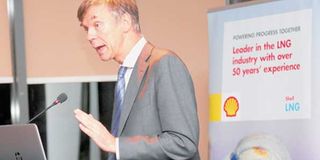LNG project on the right track: director

Shell Tanzania managing director Marc den Hartog at a past event PHOTO | FILE
INTERVIEW. As the government prepares to have individual discussions with international oil companies, The Citizen Reporter Rosemary Mirondo interviewed Shell managing director Marc den Hartog to know what is going on
QUESTION: As one of the majority share companies, what are your views about what is going on in the LNG project?
ANSWER: With some $2 billion already “sunk” during the exploration phase that started in 2010, we are naturally very keen to bring the Tanzania LNG project to fruition as soon as possible. This is an important project for Shell and our partners. To do that, we need to agree commercial, legal and regulatory terms with the government first. Progress to date has been slow, and we are very encouraged by recent advice that government would now like to accelerate the negotiation process.
Reports show that the government has allowed international oil companies, or IOCs, operating in Tanzania to have individual discussions with the government on the host government agreement (HGA). What is your stand on this?
Development of deep-water gas resources is one of the most capital-intensive businesses in the world (even more capital-intensive than developing oil resources). This means that to achieve a competitive project with maximum benefits for the country and investors, we need to build a facility that has “economies of scale”. The gas resources discovered in the Tanzanian deep water are sufficient for one world-scale project, and therefore it is our strong view that we should develop a single LNG project. Other solutions would be suboptimal. Perhaps a good analogy is to look at the EACOP [East African Crude Oil Pipeline] project which will be constructing a large heated pipeline running from Uganda to Tanga. It would be possible to replace that pipeline by two pipelines of half the size, but that would be much more costly. That cost has to be recovered, meaning less net income and therefore much less revenue for the two host governments.
Do you think we are on the right track, especially as the discussions on the HGA have been taking too long, taking into consideration that Mozambique LNG plans are moving forward?
We are on the right track, but we would always like to go a little faster, in partnership with government. There are still many steps to go through before the gas that was discovered almost ten years ago can start flowing. If this year we can lay a strong foundation with enabling Host Government Agreement Key Terms, we’re well set up to make this project happen for Tanzania.
Reports show that Mozambique was moving towards its final investment decision. What does this mean for Tanzania?
The market for LNG is a truly global market. All LNG projects have to compete in that global market, rather than compete with a particular neighbour. In that respect, a project in Mozambique has the same effect on Tanzania as a project in, say, Senegal or Indonesia. Fortunately, the LNG global market is growing well, and we therefore see good opportunity for Tanzania to compete successfully.
What lessons can Tanzania learn from Mozambique to enable the LNG project move forward and at the same time benefit Tanzania?
The situation in Mozambique is not directly comparable with that of Tanzania. For example, Mozambique has discovered a lot more gas than we have found here. Still, it is true that the LNG projects over there are moving faster than in Tanzania. One key factor is that Mozambique was quick to pass an enabling so-called sector law, already in 2014, which laid the foundations for unlocking LNG investment.
If we continue to delay, how would our LNG project suffer in the global market, if Mozambique continues to go further than us?
We have nothing to fear from Mozambique in principle, our gas is just as good, and we have five first-rate IOC investors. The only proviso is that we need to design and build a large, world-scale project in Tanzania that achieves the full economies of scale – just as the government and investors are doing in Mozambique.
Going by this, after the agreement to have sole discussions with the government, what is happening to ensure the discussions start soon?
This is something we are discussing with the government.
When exactly are the discussions expected to commence and for how long will the last
This is something we are discussing with government. A target has been set to complete the first phase of the negotiations by September. Our team is fully geared to work towards meeting that deadline.
What lessons were learnt during the IOCs group discussions with the government, and what has been planned to ensure they don’t repeat gain?
Considering that the LNG project will be the largest investment by far that Tanzania has ever witnessed, naturally this is a complex negotiation.
We’re working with the government team to have clarity on the LNG value proposition before the restart of the negotiations and look forward to have constructive engagements with the appropriate government representatives to make these complex decisions.
Shell has been in the country for sometimes now, what has the company done so far to benefit surrounding communities.
To start with, Shell is proud of the Tanzanian staff that has the majority of management in Shell Tanzania. We’ve continued to hire high calibre Tanzanian staff and continue to give them the exposure to become strong leaders of this company.
Shell is also keen to make substantial contribution through its social investment programs in Tanzania. Our priority areas of interest include support for higher education programmes in geosciences (Master’s and PhD degrees), institutional capacity building in both vocational and higher learning institutions, community and skills development programs, entrepreneurship programs and Science, Technology, Engineering and Mathematics (STEM) programs.
In addition, Shell supports ‘access to clean energy’ projects including support for the charcoal program that was initiated by the Environment Ministry in the Vice President Office that aimed at seeking alternatives for charcoal.




